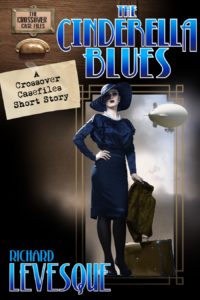Why I Don’t Teach Creative Writing
I have a few friends who are taking creative writing classes, and some of their comments have gotten me thinking about why I’ve never taken on the job of teaching such a class.
 First of all, I know that I should just get over it and teach a class the next time I get the opportunity. It would be good for me, forcing me to push past my self-imposed limits and letting me exorcise some demons. One of these days.
First of all, I know that I should just get over it and teach a class the next time I get the opportunity. It would be good for me, forcing me to push past my self-imposed limits and letting me exorcise some demons. One of these days.
My biggest issue is that I don’t know the first thing about teaching someone to be creative. And I know I wouldn’t have to do that. Most instructors seem to tackle that problem by teaching technique and hoping that inspiration will follow. Still, I worry…
And I worry because of the creative writing classes I took in the past. I don’t want to say they were all bad. In fact, the first one I took went pretty well. It focused on fiction, and the professor taught techniques for dialogue and metaphor and character development, and he actually critiqued students’ efforts that were less than successful.
It went so well that I took another, this one focused on poetry. I didn’t write poetry then, and figured it would be good for me. It wasn’t. The professor, a well-meaning but extremely free-spirited poet herself, claimed that poetry couldn’t be graded, so the main requirement for passing the class was to turn in a certain number of “qualifying” poems throughout the semester. For something to “qualify” as a poem, it had to have poetic qualities, and that was it. Our “graded” poems would be returned to us with a Q on them rather than a conventional letter grade.
I will confess to having written some truly bad poetry that semester, stuff I threw together with what I thought was some flair but absolutely no revision or sense of what I was doing. Certainly no creativity or inspiration. And I wasn’t alone. The other students, from what I recall, were as inept as I was, and everyone who contributed “qualifying” poems got an A for the semester.
My most vivid memory of the class was the guy who, upon discovering what a haiku was, wrote nothing but haiku the rest of the semester. Any subject was fair game. Even Kikoman soy sauce. Think about it: Ki/ko/man/soy/sauce: 5 syllables. Just 7 more and then another 5 and you’ve got another Q under your belt.
The next class I took, the focus was back on fiction. It was a night class, and the instructor had the habit of saying “Goooood!” in a terribly sweet way whenever anyone finished reading a piece. I can’t remember a single thing I wrote for that class. The one thing I do remember, and it’s forever seared into my brain, is this story that a classmate read to the class. I’ll paraphrase:
Back in the 1800s, there was a boy who lived on the east coast, and he was enamored of the wild west. He read stories about western heroes and fantasized about going west, but he knew that he never could because he was a polio survivor who couldn’t walk without the aid of crutches. So instead, he and his best friend Jake would spend their days at the train station, watching travelers departing for the west. One day, the boy met a dentist who was going west, making the journey to Arizona because it would be better for his tuberculosis. The dentist was Doc Holiday, and he inspired the boy to go west as well, crutches and all. If Doc Holiday could do it, so could he. And his best friend Jake would come along.
Before long, the boy got himself a job working at a railroad switching station at a lonely outpost in the western desert. He and Jake had a great time, and he felt such a sense of responsibility for throwing the switch to guide the trains to safety as they rumbled past his station. One afternoon, as a train made its way toward the station, the boy caught the tip of his crutch on the track, and he fell, breaking his crutch as he did. He lay there, watching the train get closer and closer, knowing not only that it would kill him but also that the switch wouldn’t be thrown in time and a horrible accident would follow. There was nothing to do but ask Jake for help, and so he did. Because Jake had been with him the whole time, he knew what to do, and the boy was so happy when the switch was thrown. His life was saved and disaster was averted.
He thanked his best friend Jake.
But Jake didn’t say anything in return.
He couldn’t.
Because Jake was a baboon.
 She finished reading, and the teacher said, “Goooood!” And I wanted to die. I wanted to tell my classmate that you can’t have a twist ending with no set-up like that, no hint that the reader can go back to later and say, “Ah, I should have seen that coming.” But the class wasn’t set up that way. And we moved on to the next story.
She finished reading, and the teacher said, “Goooood!” And I wanted to die. I wanted to tell my classmate that you can’t have a twist ending with no set-up like that, no hint that the reader can go back to later and say, “Ah, I should have seen that coming.” But the class wasn’t set up that way. And we moved on to the next story.
I know that I’ll handle things differently if I ever find the nerve to helm a creative writing class. But I’m not sure I’ve got the nerve. There are some traumas just too severe to get over.
bad poetry Creative Writing creative writing classes Doc Holiday Writing







7 Responses
Reading these stories, I feel lucky that the two Creative Writing classes I took were as great as they were. I didn’t really want to go on, mostly because academic classrooms suited me better, but at least there weren’t any baboons.
I’ve never taken a creative writing class, an omission in my education that I don’t regret. I doubt such a class would affect my creativity except to perhaps stifle it. I can understand that it’s annoying when a teacher grades poetry with a “Q,” but what else can she do? How can a teacher put a letter grade on someone’s creative work? As someone who writes book reviews, I ask myself the same questions, knowing that it’s all subjective and only my opinion. I particularly loathe reducing my thoughts to a number of stars, as Amazon requires. However, the risk of harm resulting from a negative review is less than the harm that could result from a bad letter grade in a creative writing course (authors may disagree!). My book review is only one that a book may receive and, if I am in the minority, positive reviews will eventually drown mine out (and sometimes the “bad publicity” results in increased sales). A grade in a class is different. Maybe it’s one of many grades that will lead to a final grade, but what if the teacher simply does “get” the student’s work? The result could be a bad final grade, perhaps affecting graduate school and job applications. Even worse, it could deter students from writing altogether at such an early point in their lives, long before they ever have the opportunity to publish and share their work more widely.
Good points. Especially with classes that involve writing, there’s this element of subjectivity in the grading that can be pretty troublesome for students. In most cases, I’d like to think the student who gets undeservedly poor grades would at least talk to the professor to try and figure out the problem. Maybe I should re-think things and go to giving students a Q or a U (unqualifying) instead of letter grades.
I laughed out loud at the “gooood” comment after that awful story! Very funny. I have a degree in writing–not an MFA though. It’s an MA in English with a concentration in writing. So, yes, I took a whole bunch of those classes.
And I actually did, learn a lot. But, looking back, the workshop style classes were the most effective. Here we didn’t really talk about technique, we just spent the entire 2.5 hour critiquing each other’s work. That’s what taught me how to write better. Fix this, fix that, etc. Plus, I also liked when the professors had us read model fiction, nonfiction, etc. Analyzing work from well-known, professional authors gave us a sense of what we should be aiming for.
In all though, writing is hard to teach. A teacher and a writer should meet half way. Most of what I’ve learned, I’ve done through trial and error. On my own.
Nice piece. Great discussion topic
I enjoyed this post a lot. Thank you. It made me smile. I like your gentle sense of humour.
Thanks for reading and commenting. It’s always good to know what appeals to people.
“She finished reading, and the teacher said, ‘Goooood!’ And I wanted to die.”
Hilarious! 😀
It’s interesting to think about the negative effects of praise for beginning writers, as well as overprescribed criticism. Excellent post.
Comments are closed.